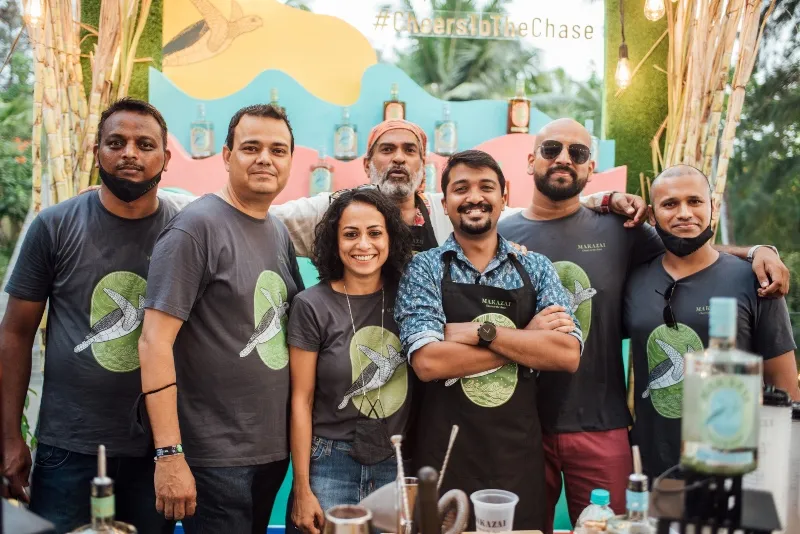[100 Emerging Women Leaders] Why did this banker quit her lucrative job to make rums in Goa
In this feature of 100 Emerging Women Leaders, we feature banker turned rum-maker Kasturi Banerjee, who started Stilldistilling Spirits that makes Maka Zai Rums.
“I loved my job and Mondays. Being an investment banker for me was the best thing ever,” says Kasturi Banerjee, who now runs Stilldistilling Spirits. She founded two years ago in Goa, the distillery makes Maka Zai Rums.
After 16 years of working as the former director of compliance at an MNC bank, one morning, Kasturi decided to do something different in life.
“I was sure that if I didn’t make a switch then or try something different, I never would. And it wasn’t because I hated my job; it is quite the opposite. I just wanted to do something different,” Kasturi tells HerStory during an interaction.

It may be hard to fathom someone leaving their “lucrative well-paying job” to get into making rums and building a business out of it.
She says being a compliance director for years taught her to be ‘super paranoid’. “I double and triple check everything that I need to do,” Kasturi adds.
Sitting at her home office in Goa, Kasturi jokes that while the region is great for its spirits and beaches, the internet isn’t exactly the best.
Banker to a bartender
Kasturi was exposed to different forms of spirits while travelling during her former job. Wanting to explore more, Kasturi attended various courses on spirits and bartending.
“It was fun learning something new and different, and that is what I focussed on for some time. I became a bartender, and that life was so different. I would begin working in the afternoons, where I would prep for my drinks during the day, and would spend the night until next day morning on my feet mixing drinks,” she says.
In fact, she conducted different whisky tasting sessions, including the likes of award-winning single malt whisky brand Paul John. Although Kasturi enjoyed her bartending life, she knew it wasn’t something she wanted to do full time.
“I wanted to learn more about alcohol and how to make spirits. I wanted to know more about making rums,” says Kasturi.
She adds, “While I love Old Monk, it isn’t the same. I wanted to do something different. While there was this big focus on gin, I wanted to look at rums.”

The reason why she chose rum: “There simply isn’t any drink that stands out in rum. There isn’t something that is super high end or premium, something that is Indian, and suits the Indian palates.”
Kasturi explains that India is one of the largest producers of sugarcane in the world and has a wealth of raw materials needed to make the spirit.
“I travelled across the country and world to see what was available. We tested hundreds of samples of raw material like cane and then chose our suppliers,” says Kasturi.
The Maka Zai white rum is made from sugarcane found in Maharashtra, along the Panchganga river, where the cane is sweeter, and the flavours of spices and herbs are picked up from the soil around. Its gold rum is from a spirit from Punjab blended with hints of cinnamon, caramel, and honey.
Stilldistilling Spirits’ Maka Zai Rums — White and Gold — are priced at Rs 1000 and Rs 1300, respectively, in Goa.
The market for domestic distilleries and breweries is growing, with the presence of companies, including Bira, White Owl, etc. There is also Blisswater distilleries that makes Rahasya Vodka.
A Goldstein Market Intelligence report forecasted the Indian alcoholic beverages market to grow at a CAGR of 7.4 percent between 2017 and 2030. The market is anticipated to reach $39.7 billion during the same time.
Kasturi says, “It isn’t easy making and running an alcohol business; you will always be judged. But I just kept going at it and focussed on what I wanted to do. The trick is to keep asking the same question over and over again until you get a response.”
Edited by Suman Singh


![[100 Emerging Women Leaders] Why did this banker quit her lucrative job to make rums in Goa](https://images.yourstory.com/cs/4/a9efa9c02dd911e9adc52d913c55075e/KasturiBanerjee800x400-1630389709902.png?mode=crop&crop=faces&ar=2%3A1&format=auto&w=1920&q=75)
![[100 Emerging Women Leaders] Launched from home, these sisters' D2C startup has attracted celebs like Anushka Sharma, Taapsee Pannu](https://images.yourstory.com/cs/4/a9efa9c02dd911e9adc52d913c55075e/100EmergingWomen-AartiandAkankshaChhabaria-01-1629858010991.png?fm=png&auto=format&h=100&w=100&crop=entropy&fit=crop)




